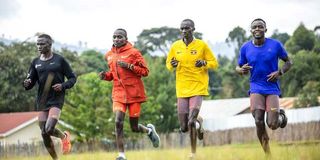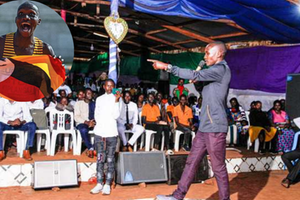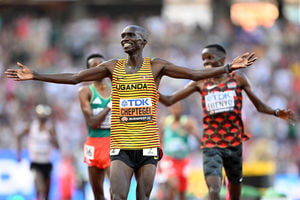
From left, Job Chepkwurui, Victor Kiplangat, Joshua Cheptegei and Nicholas Cheptoyek warm up before training at the Sebei College Tegeres in Kapchorwa, Uganda on June 10, 2024.
After dominating 5,000 metres and 10,000m races globally at Kenya’s expense, multiple world and Olympics champion Joshua Cheptegei of Uganda now plans to take his rivalry with Kenyans to the next level after the 2024 Olympic Games in Paris.
Kenya’s struggles over the two distances, particularly over 10,000m, make for a painful read, and three-time world 10,000m champion Cheptegei, who is also the reigning Olympics 5,000m champion, is to a great extent responsible for the country’s woes.
Naftali Temu was the first and last Kenyan to win gold medal in men’s 10,000 metres when he triumphed at the 1968 Olympics in Mexico, the country has endured a 56-year title drought. At next month’s Olympic Games in Paris, Kenyan youngsters Daniel Mateiko, Nicholas Kimeli and Bernard Kibet will come up against reigning champion Selemon Barega of Ethiopia, Ugandan duo of 2020 Olympics silver medallist Joshua Cheptegei and bronze medallist Jacob Kiplimo, among others, in the 24-lap race.
In the past six years, Cheptegei has beaten every Kenyan athlete he has come across at a major championship, be it at the Olympics or at the World Athletics Championships. At the 2023 World Athletics Championships held in Budapest, Cheptegei won gold in men’s 10,000m race at Kenya’s expense when he locked out silver medallist Daniel Simiu in a close contest. Kenya’s Bernard Kibet and Nicholas Kipkorir finished fifth and eighth respectively.
Men’s 10,000m race
At the 2022 World Athletics Championships in Oregon, Cheptegei won men’s 10,000m final ahead of Kenya’s Simon Mburu. Another Kenyan, Daniel Mateiko, faded to eighth place.
At the 2019 World Athletics Championships in Doha, Cheptegei won men’s 10,000m race, followed in second place by Yomif Kejelcha of Ethiopia. Kenya’s Rhonex Kipruto claimed bronze.
At the 2017 World Athletics Championships held in London, Kenya’s Paul Tanui claimed bronze behind race winner Mo Farah of Great Britain, and silver medallist Cheptegei of Uganda. Kenya’s Bernard Karoki and Geoffrey Kamworor faded to fourth and sixth respectively.
And at the delayed 2020 Olympic Games held in 2021 in Tokyo, Cheptegei won gold in men’s 5,000m race as Kenya’s Nicholas Kipkorir faded to fourth.
After tormenting Kenyans on the track in major championships, the reigning Olympics 5,000m and world 10,000m champion has announced that he will switch to the marathon from track after 2024 Olympic Games, and he has welcomed competition from Kenyan marathoners.
“As I exit track which has been a good success story despite some setbacks, I know I’m going to meet Kenyans in the marathon and as I said, it is a learning process and I expect to even do better in future,” Cheptege, who is finalising his training in readiness for the Olympic Games, told Nation Sport in Kapchorwa, Eastern Ugandan.
Cheptegei said Kenya and Ethiopia dominated track competitions for a long time but things changed in the last few years when Ugandans came to the scene, and he is glad that his country of birth has remained on top in many competitions.
He said that tough competition, especially from Kenyan athletes, has inspired him to work harder, and to focus on doing the right thing.
“I must admit Kenyans have made Ugandan athletes work extra hard, me included, because they are many compared to us here in Uganda. They are special and the competition has been a healthy one. When you combine that with Ethiopians, it makes the competition worthy of waiting to watch,” the 27-year-old added.
Cheptegei says he has been inspired to take up the marathon by his mentor and former training mate, Eliud Kipchoge who has had a successful career in track and road races.
Road races
“To tell you the truth I have had a successful career in track and it’s time to move to the next thing, which is road races, and marathons. I have overcome many challenges so far, and I have come back to win title after title in track, and it’s good to exit now,” he said.
Cheptegei made his debut in road running in the 2023 Valencia Marathon last December, finishing 37th in a personal best time of two hours, eight minutes and 59 seconds, something he says was a learning process.
But first, he is determined to leave the track with his head held high as a gold medalist in men’s 10,000m at the Paris Olympic Games.
He said his secret to success is to compete in few races ahead of major championships, and this year has been no different. He heads to the Olympics next month, having competed at the Oslo Diamond League on May 30, finishing ninth in men’s 5,000m race.
“This is a very important year for me and my country, and I am looking forward to winning a gold medal at the Olympics despite a slow start to the season. The races are important because it allows you as an athlete to rectify various things ahead of a major event, but I prefer doing one or two events as part of my preparation,” Cheptegei said when we tracked him in training in Kapchorwa last week
Currently, he is perfecting splits which he says will help him compete well due to the high competition that he anticipates.
The Olympics 5000m gold medalist who is also a three-time world 10,000m champion is renowned for his strong finish in races. He believes the hard work he has put in training will reflect on his performance at the Olympics.
“The last two years have not been good for me, and it looked like it was a little bit of a struggle, but I have trained well even though I haven’t finalised the programme yet. I believe by the time we compete, I will be in top form. I want to sign off from track in style,” said Cheptegei.
Cheptegei adds that his story is similar to other athletes who were born and bred in poor backgrounds, but he is out to encourage upcoming athletes to think positive and to do the right thing. He has challenged youth to remain focussed on achieving their dreams.
“There are so many athletes currently in Kapchorwa and Kween in Uganda and that tells you that the upcoming generation must have learnt that anything is possible, and have been inspired by our performance. As I exit track races, I believe there are others coming to fill the gap left,” he said.
Cheptegei was inspired to take up athletics by Moses Kipsiro who won two gold at the 2010 New Delhi Commonwealth Games in India. Following that performance, Kipsiro, who was a student at the time, got a handsome cash reward and a house from President Yoweri Museveni.
Cheptegei also remembers watching his compatriot Stephen Kiprotich win gold medal in marathon at the 2012 London Olympic Games, something which he says inspired him to take up athletics while in secondary school.
“What also motivated me to try athletics and perfect it was the goodies the two athletes received from the government. I dreamt of one day getting the same, and I’m glad my career has grown. Everybody now says ‘I want to run so that I can be given a car or get a house from the government’ and that’s how the sport started growing in Uganda,” he adds.
Commonwealth Games
In 2013, President Museveni announced a reward scheme for Ugandans who win races abroad.
Those who win at the continental level, in the Commonwealth Games, at the World Athletics Championships, or at the Olympic Games would be paid the equivalent of Sh174,210.52 per month, silver medallists be paid Sh104,526.31, and bronze medallists Sh34,842.10. Ugandan athletes have also been rewarded with cars upon arrival back home after excelling in global championships.
In terms of training area, Cheptegei who at one time trained at Kaptagat in Elgeyo Marakwet County, terms Kapchorwa as a virgin territory with great potential for high-altitude training. Just like Iten in Kenya, Kapchorwa has ideal training conditions which made Cheptegei to relocate there.
Cheptegei reckons the newly built Teryet High Altitude Training Centre which has a tartan track will help them train well. It was built by the national government following Kiprotich’s exploits in London.
Cheptegei’s star shone brightly at the 2014 World Athletics Junior Championships in Eugene, Oregon, where he won gold in 10,000m race, and finished fourth in 5,000m.









